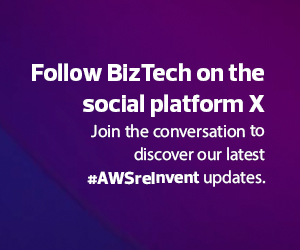AWS, which is the world’s largest cloud-services provider with a 31% market share, also said it would make it easier for organizations to prevent “unintended actions” within cloud environments with two new “preventative controls.”
Declarative policies allow organizations to prevent noncompliant nodes from arising on their environments “by simply declaring the configuration that you want for a particular AWS service,” Ramani said. “Once set, this declarative policy will always maintain that configuration you set, even as your environment changes.” Resource control policies allow managers to set the maximum allowable permissions available to any cloud resource. “In this way, you can restrict access and unintended actions with any of your resources,” she said.
How Capital One Uses AWS to Manage a Massive Cloud Environment
Parvez Naqvi, managing vice president of resilience and reliability engineering for Capital One, one of the largest financial services organizations in the U.S., said that AWS’ services were indispensable as it began its transition in 2016 to becoming a “cloud first” organization, culminating in 2020, when it exited all data centers.
“We were able to build and manage a very complex infrastructure” on AWS, Naqvi said. “This in turn has helped with resiliency and our overall governance.” In the past five years, he said, the number of tech-related incidents that affected customers was reduced by 75% even as its “cumulative cost efficiency” improved by 70%. “What’s interesting to me about these two numbers is that we used the same technology and the same data to manage governance, to answer various questions and conduct audits.”
LEARN MORE: Master the art of cloud management with CDW’s Inscape platform.
One thing that helped was its early adoption of the resource control policies feature that AWS announced for general consumption on Dec. 2. “We were part of the beta,” Naqvi said. “We used these types of services to restrict access to our very large infrastructure.”
Capital One’s environmental complexity stems from its need for scale, security and virtually perfect performance of its many applications. “If I say that we operate at four-nines reliability,” referring to the term for a system that works as it should at least 99.99% of the time, he said, “some might say that’s good, or others might say, no, you should be at five nines. But let’s look at it from a customer perspective.”
A customer whose wire transfer doesn’t go through when they’re trying to close on a new home purchase is going to be angry. “I can’t say, “Oh, sorry, you were one of those 0.01% of failures. For us as a bank, failure is not an option.”
To learn more about AWS re:Invent, visit our conference page. You can also follow us on the social platform X at @BizTechMagazine to see behind-the-scenes moments.













